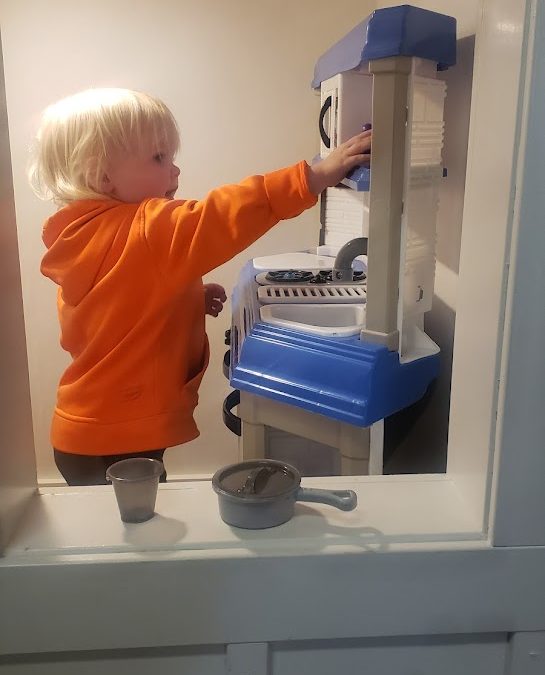Cook up a delicious meal, perform a check up on your puppy, use some tools to fix a chair, and heal a sick patient. It’s all in a day’s work for your child when he or she participates in imaginative play at home! Not only is playing pretend a fun and engaging way for children to use toys, but it’s been proven to have countless benefits on their language, cognitive, and social-emotional development.
18 Months: The Language Learner
What might just look like a tower of blocks to a parent can be a gumball machine, airplane, or a zoo in their child’s eyes. Between 12 to 18 months, your little one starts understanding that one thing can symbolize another. Not only toys, but words! They learn that words can represent their thoughts or names of objects and they start developing language. (Suggested toys: play food/kitchen)
2 Years: Toddlers Who Talk Action
Sleeping, flying, cooking – pretend play is full of action! Teach your toddler to add verbs to his or her vocabulary by modeling them as you play. Narrate what you are doing and what you observe your child doing, such as, “Nice stirring!”. (Suggested toys: tool kit)
3 to 4 Years: Independent Thinker
By this age, children learn to follow others’ cues and become more independent in how they imitate everyday activities they’ve seen. They’ll even start to pretend about things they may have never actually experienced, like taking a rocketship to the moon or going camping! Encourage your child’s independence by becoming involved and role-playing along with your child, while talking to him or her at eye-level to show your interest. (Suggested toys: doctor set)
5 to 7 Years: The Problem Solver
Through imagined play, you can help your child learn to use cognitive skills such as problem-solving! Talk things through with him or her during play and give choices of possible solutions to problems. Turn-taking is a social skill that does not develop naturally but can be practiced during play. This teaches your child to take someone else’s person’s point of view and apply self-regulation skills such as patience. (Suggested toys: toy pet or doll)
8 Years and Up: Super Sequencer
That’s right, even children at this age can benefit from engaging in imaginative play! Besides continuing to develop their social skills, it can be a fun, hands-on way to enhance some auditory processing skills. (Suggested toys: play food/kitchen order sandwiches with a number of different ingredients)
Imaginative play is a great way to ignite your child’s language, cognitive, and social-emotional development! If you have concerns with these areas, consider consulting an expert–like any of the therapists at Rehab Specialists of Idaho.
This is an excerpt from an article that was originally posted in February 2021. Click to read the entire post at therapyworks.com

